Bass CDs
New Album: Bassist and Composer Adi Meyerson “I Want To Sing My Heart Out In Praise of Life”
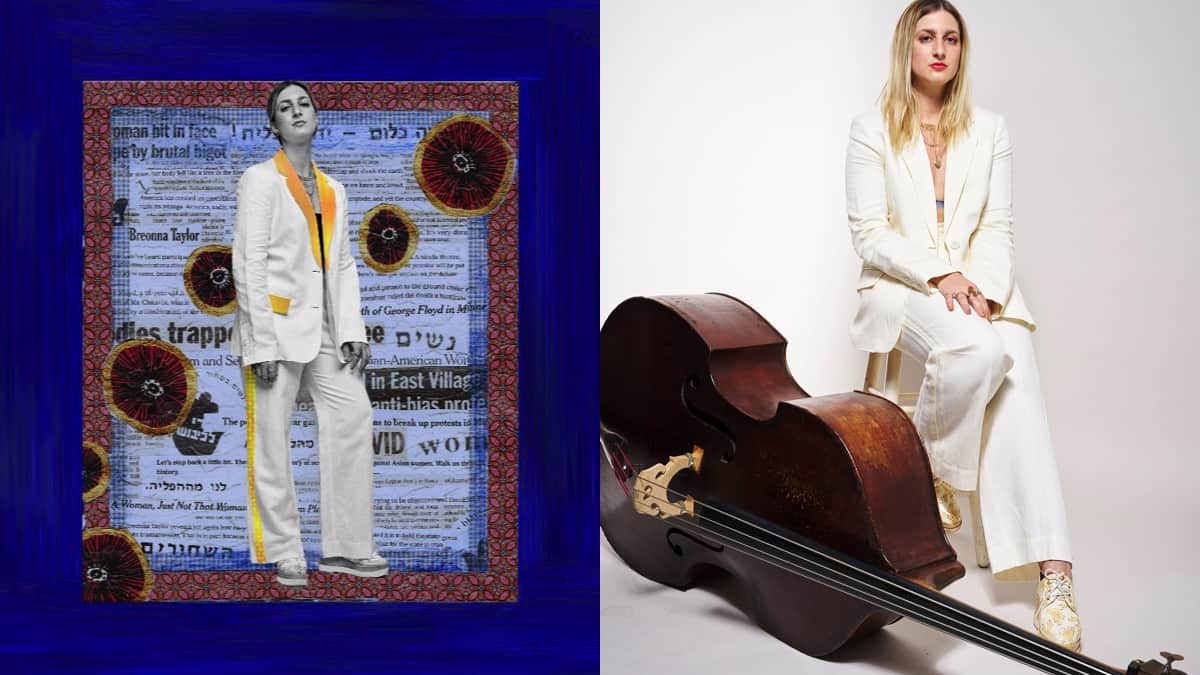
Bassist and composer Adi Meyerson is proud to unveil her new full-length album I Want To Sing My Heart Out in Praise of Life.
On her adventurous sophomore offering, Adi Meyerson takes listeners on a six-part musical journey inspired by the life and work of iconic avant-garde visual artist Yayoi Kusama. Using Kusama’s work and intentions as a springboard, Meyerson aims to create a sonic safe haven for listeners that mirrors an ideal, utopian society devoid of negativity and strife. Featuring Marquis Hill on trumpet, Anne Drummond on flute, Lucas Pino on bass clarinet and saxophone, Sam Towse on keys, Kush Abadey on drums, spoken word artist Eden Girma and vocalists Sabeth Perez and Camille Thurman, this powerful new album will be available everywhere on August 6, 2021. Meyerson will be celebrating the album release at Minton’s in New York City that evening at 7:00 and 9:00 PM.
Meyerson’s latest release first gained legs in late 2017, when she and a friend attended an exhibit featuring the work of Yayoi Kusama in downtown New York City. She was moved by Kusama’s artist statement and personal story; notably how her art provides a utopian place for people, as well as the artist, to spiritually and mentally escape to. The art itself resonated with Meyerson too. Meyerson has synesthesia – a neurological condition in which two senses overlap and trigger each other (also commonly called “crossing of the senses”) – and in her case, she sees color when she hears certain pitches. To Meyerson’s surprise, much of Kasama’s color palette matched her own visual perception when she heard certain pitches, giving way to an unconventional but creative compositional process that involves Meyerson deriving melodies from the colors she sees.
A few years later, and with a supportive push from her graduate school professor Dave Liebman at Manhattan School of Music, Meyerson decided to put pen to paper on what would eventually become I Want To Sing My Heart Out in Praise of Life. “I describe my experience with this project as a journey, because a lot has happened in the time that I conceived of it and now,” reflects Meyerson. She cites the pandemic lockdown as being an important part of the final product. Using Kusama as a catalyst, “the music and the message behind it took on a new form, and became a vehicle for me to further explore my identity and womanhood and face my own mental health struggles,” she shares. I Want To Sing My Heart Out in Praise of Life is her offering – and like Kusama aims to do with her own work, Meyerson hopes to immerse listeners in their own sonic version of utopia upon listening.
Album opener “Prelude” establishes the mood with spoken word artist Eden Girma leading the charge. Treating the celestial melodic theme as if it were a drone, the emotional charge builds swiftly as new colors and vibrant textures envelop the listener, setting the stage for what’s to come. Track two is “Kabocha”, which features a counterpontal melody presented over Meyerson’s groovy ostinato bass line. The pitch material for this track, which takes inspiration from Kusama’s fantastical installation of the same name and means “pumpkin” in Japanese, was derived from the colors Meyerson sees in the work, and the rhythmic pattern comes from a well-known recording of Kusama reciting her poem “On Pumpkins”. Both Lucas Pino, on bass clarinet, and flutist Anne Drummond take particularly affecting solos on this dynamic musical odyssey, which opens with Kush Abadey’s masterful drumwork.
Marquis Hill features prominently on “Follow the Red Dot”, which like its predecessor, utilizes the pitches that coincide with the bandleader’s synesthesia. The driving energy of the piece mimics the “simultaneous feeling of chaos and perfect organization I felt when standing in Kusama’s Red and White Polka Dot Room,” shares Meyerson. This tune is also an ode to the artist’s provocative 1965 work “Phalli’s Field”, which is a favorite of Meyerson. Lined with mirrors and carpeted with a plethora of polka-dotted fabric protrusions that Kusama called ‘a sublime, miraculous field of phalluses’, the installation was an important moment for the artist. Next up is “Caged Bird”, a brilliant feature for Camille Thurman who sings and scats a compelling ode to the “perfect world” and what we’d have to change as a people to get there. In composition and lyric, Meyerson paid tribute to two of her favorite literary pillars: Angela Davis and Maya Angelou.
Part V, “Infinity”, is once again directly inspired by Kusma – in this case, her famous Infinity Mirror Rooms. Opening with an exceptional solo by Meyerson and prominently featuring Sabeth Perez’s ethereal wordless vocals, this contemplative tune is written from the perspective of one looking in the mirror, and examining oneself. It is also an homage to Meyerson’s native Israel, and a nod to its infinite complexities – both as a place, and in relation to her own identity. The poignant and moving title track closes the album, and is a thoughtful parting gift from the bandleader. ““I Want to Sing My Heart Out in Praise of Life”is meant to be a prayer for those who feel they cannot live their life to the fullest,” says Meyerson. “It’s also a reminder for all humans that being alive is a gift and worth celebrating.” This emotional closer is made even more powerful by it’s pared down instrumentation – Thurman’s soulful voice is accompanied only by Sam Towse’s gorgeous accompaniment.
I Want To Sing My Heart Out in Praise of Life is an important new addition to Adi Meyerson’s impressive musical canon. Her debut album, Where We Stand, was released in 2018 to widespread acclaim. Bob Doerschuk of Downbeat Magazine awarded the album a coveted four and a half stars and called it “intuitive and perspicacious…displays a musical maturity that belies her newcomer status.” Since arriving in New York in 2012, Meyerson has established herself as a first-call bassist – she performs regularly throughout the city’s top jazz venues, and has played with a who’s who of jazz greats including Joel Frahm, Joe Magnarelli, Steve Nelson and Charli Persip, among many others. With her own group and as a side musician, Meyerson has performed all throughout the United States, Latin America and Canada.
This project was generously funded by a grant by the New York Foundation Arts 2020 Women’s Fund.
Track listing:
- Part I – Prelude
- Part II – Kabocha
- Part III – Follow The Red Dot
- Part IV – Caged Bird
- Part V – Infinity
- Part VI – I Want To Sing My Heart Out In Praise of Life
Visit online at adimeyersonmusic.com
PHOTO, RONALD STEWART
Bass CDs
Reissue: Geddy Lee’s My Favourite Headache and Alex Lifeson’s Victor
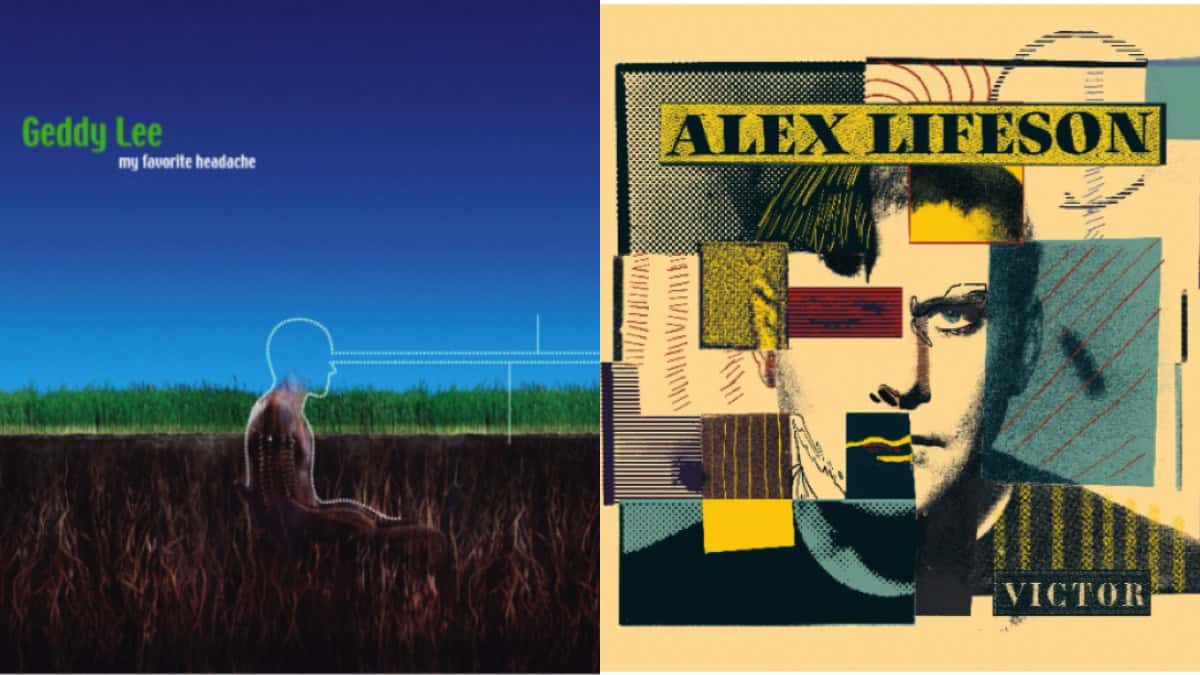
In an exciting announcement for Rush fans and rock enthusiasts alike, Anthem Records in Canada and Rhino Records will reissue the first-ever solo albums of Alex Lifeson and Geddy Lee. Lifeson’s 1996 album Victor and Lee’s 2000 offering My Favourite Headache will be re-released on August 9, 2024, in various formats, including a range of vinyl configurations.
My Favourite Headache, Geddy Lee’s only solo album to date, was initially released on November 14, 2000. This reissue marks its first vinyl pressing since a limited-edition Record Store Day exclusive in 2019. The fourth side of the album features two instrumental mixes. Produced by Lee, Ben Mink, and David Leonard, the album includes contributions from Mink and drummers Matt Cameron (Soundgarden/Pearl Jam) and Jeremy Taggart (Our Lady Peace).
Victor, originally released on January 9, 1996, marks Alex Lifeson’s solo debut. Lifeson took on the roles of songwriter, producer, and mixer for this album. For the first time, Victor will be available on vinyl, featuring a complete remix by Lifeson himself to enhance the audio quality. The fourth side of the album includes four instrumental tracks previously exclusive to Lifeson’s website. Guest artists include lead vocalist Edwin from I Mother Earth, Primus bassist Les Claypool, and Canadian powerhouse vocalist Lisa Dalbello. The 15-song collection is paired with striking 2024 reimagined artwork by Fantoons Animation Studios.
For more details on the Geddy Lee reissue and to preorder, https://lnk.to/MyFavouriteHeadache
For more details on the Alex Lifeson reissue and to preorder, https://lnk.to/AlexLifesonVictor
Bass CDs
New Album: Ben Wolfe, The Understated

Acclaimed bassist and composer Ben Wolfe is thrilled to announce the August 9, 2024 release of The Understated.
This evocative new album features a collection of new original compositions by Wolfe paired, with re-imaginings of some of the composer’s classic material, with a particular emphasis on the ballad song-form. The album features ten tracks, five of which are ballads – a bold move for any composer – Wolfe creates a cohesive narrative here that challenges the listeners perception of the classic ballad. The Understated features Wolfe alongside artists who make up the very frontline of modern jazz, including pianist Orrin Evans, tenor saxophonist Nicole Glover, drummer Aaron Kimmel, guitarist Russell Malone and pianist Sullivan Fortner.
Wolfe has always been drawn to finding beauty in subtlety. He perceives a certain tranquility and elegance in the Coltrane Quartet, Louis Armstrong’s Hot Fives and Sevens, the legendary Miles Davis bands and rhythm sections, and the music of Charlie Parker. While he, of course, revels at the immense world-building energy of this music, it’s the “other side” – the elusive, magical aspect that endlessly captivates him – the understated. The composer draws inspiration most from the ensemble work of these hallmark jazz ensembles. Despite the individual parts being extraordinarily beautiful on their own, the musicians in these archetypal ensembles play only what is needed to serve the music, paying particular attention to the band-sound more-so than their individual sound. The Understated embodies this ethos with a tremendously impactful ensemble-oriented approach.
Wolfe sought to continue the thread started by “Lullaby in D” from his previous critically acclaimed release Unjust. Wolfe indicates, “Something about that take was so perfect to me. It had been brought to life, and it had that ensemble thing.” Wolfe assembled the quartet who recorded “Lullaby” (including longtime collaborator Orrin Evans, as well as recent frequent collaborators Aaron Kimmel and Nicole Glover) and two very special guests, Russell Malone and Sullivan Fortner. The recording process took place in one room with no headphones or isolation booths, further emphasizing the group’s collective awareness.
This record succeeds in bringing Wolfe’s expansive music to life through extremely conscientious group playing. Nothing is forced or pushed; everything that needs to be stated is stated. The single from the album, “Waltz,” encapsulates the spirit of the project. Wolfe says, “I view albums like a complete painting, so singles have been difficult for me. This song is very much in the spirit of the whole but doesn’t give away the record.” The piece features a sentimental melody delivered with grace by tenor saxophonist Nicole Glover, before Glover and Evans embark on stirring solos dancing in and out of the tune’s harmony.
Other new original compositions featured here include “Ballad in B”, which perhaps best demonstrates the group’s stunning cohesion. This tune is a refreshing diversion as it features a serene repeated melody without overt melodic improvisation. The following track, “Anagram”, begins with Kimmel’s rhythmic refrains and a unison melody played by Glover and Wolfe and is a true ensemble piece. On this track, Wolfe shines with a lyrical solo. The moody short interlude “So Indeed” is a lyrical masterwork that leaves the listener wanting even more. “Beautiful You” features master guitarist Russell Malone on the track’s melody. The emphasis here on restrained lyricism is a prime reminder of the old adage “it’s not the notes you play, it’s the notes you don’t play”. Each pocket of space in between melodic moments leaves room for the listener to breathe deeper and deeper into the song. The driving “Triangle Man” features fantastic improvisation from Glover and Kimmel. The tender “Barely Spoken” concludes the album with a feature for pianist Sullivan Fortner.
The album also weaves in references to Wolfe’s past works, creating a personal musical universe. “The Poet Speaks” is the opening track on his first record, 13 Sketches. “Occam’s Razor” was composed years ago for a collaboration with a choreographer and painter, and was a much different composition in its original form. “Love Is Near” was originally found on The Whisperer. With ballads in particular, Ben uses voicings and sounds that represent certain things to him, intentionally referencing his other compositions to generate connections between his songs.
Wolfe’s tremendous compositions on this album are also influenced by the group of musicians that he assembled for this release. Wolfe remarks “One of the things these five musicians share in common is that not only are they true ensemble players, they will always play something unexpected and special.” Listeners will find calm and beauty within the ensemble performances throughout The Understated.
Visit online at benwolfe.com/
Bass CDs
New Album: Orlando le Fleming, Wandering Talk
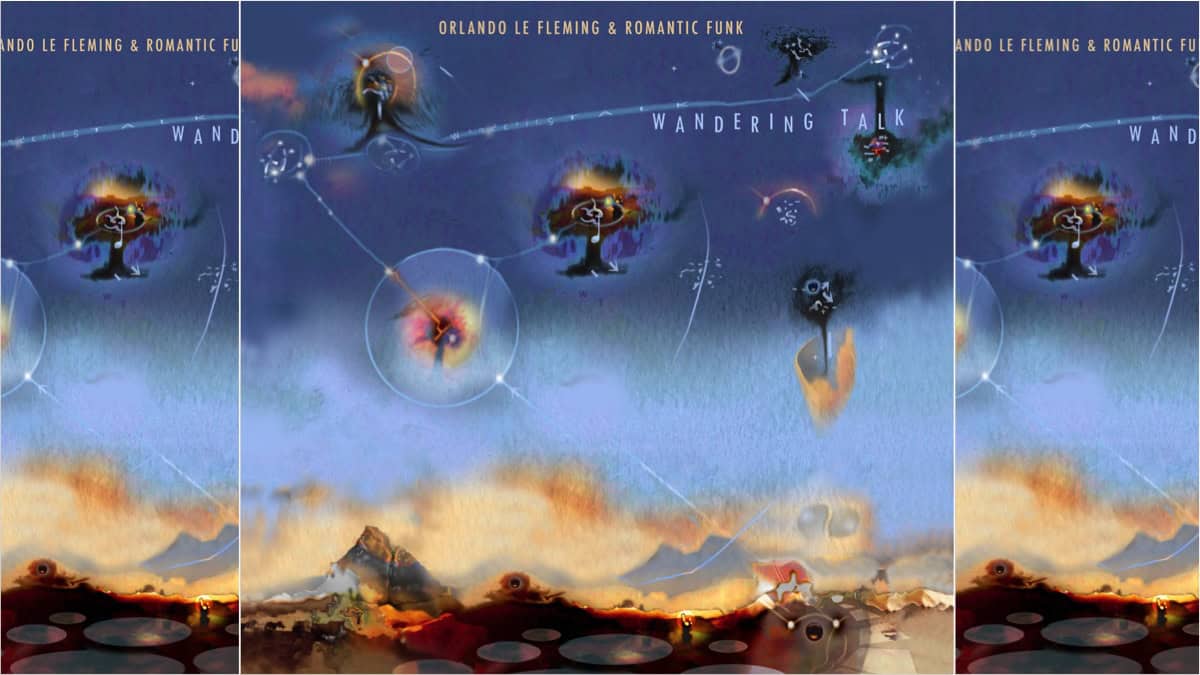
Bassist, band leader, and composer Orlando le Fleming continues to make music that crosses genres as readily as he crosses the Atlantic, with this new album ‘Wandering Talk’, to be released physically on 23rd August via the UK’s premiere jazz label, Whirlwind Recordings.
After 20 years in New York City, he’s back in his native UK, forging new pathways and renewing old partnerships. His love for the acoustic tradition continues unabated alongside his deep affection for the robust, muscular electric fusion that emerged in the 1980s, and he has received critical acclaim from media including The Guardian, Financial Times, Jazzwise, and All About Jazz among others. He has also toured and recorded with some of the world’s greatest jazz musicians including Branford Marsalis, Kurt Rosenwinkel, Antonio Sanchez, Ari Hoenig, and Wayne Krantz.
The Romantic Funk project was born in New York’s legendary 55 Bar to explore that legacy: now the new album ‘Wandering Talk’ builds on the critical acclaim generated by ‘The Unfamiliar’ (2020), building on the framework with a set of collaborators that brings together London and New York, past and present, acoustic, and electric, and merges it all into a spectacular whole.
Following the same principles that served the project in NYC, le Fleming booked four Friday nights at London’s renowned Vortex Club to workshop the music that would become the album, with a rotating cast of players which he honed down into the final line-up. Old London friends Tom Cawley (piano/keys) and James Maddren (drums) completed the rhythm section. New acquaintance Nathaniel Facey was picked from the ranks of the UK’s brightest young saxophone players. NYC stalwart Philip Dizack flew in from the US to play trumpet and reaching back to Orlando’s school days and forward to his own family, one-time classmate Chris Martin (Coldplay) and his own daughter Nadia combined to provide vocals on a special setting of Rumi’s poetry.
As before, the music combines fusion’s flash and fire with a contemporary sensibility. This time, Orlando’s questing spirit sends his superb band forward to investigate fresh areas of creativity in dynamic and texture.
Visit online at orlandolefleming.com
Bass CDs
Album: John Entwistle, Rarities Oxhumed – Volume Two
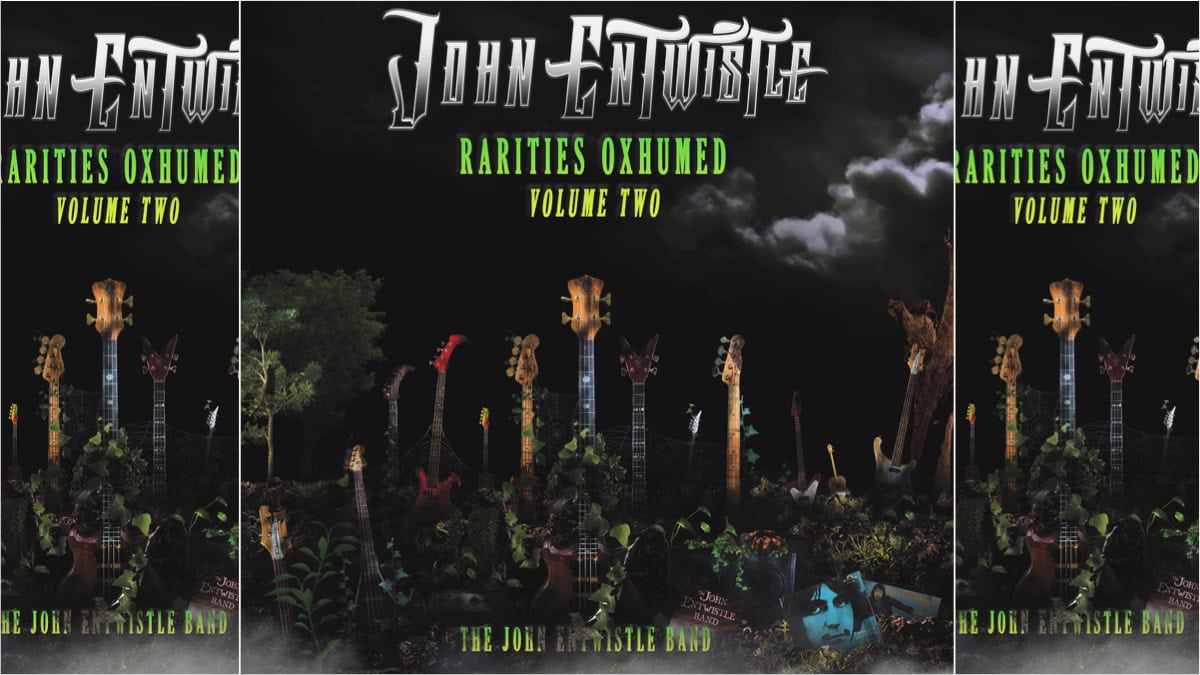
Album: John Entwistle, Rarities Oxhumed – Volume Two
Rarities Oxhumed – Volume Two is the second of the series of posthumous releases coming from John Entwistle.
Rarities Oxhumed – Volume Two is a compilation that was curated by drummer Steve Luongo, who served as John Entwistle’s producer, bandmate, business partner and good friend for many years. As Luongo states, “When I agreed to do two volumes of John Entwistle rarities, I knew volume two had to be even better than volume one. It is!” The collection of songs on Volume Two are from his years with the John Entwistle Band and include re-mastered versions of studio tracks including “Endless Vacation”, alternate mixes of tracks like “Sometimes”, and live tracks including The Who cuts “Real Me”, “Long Live Rock” and an epic version of “Young Man Blues”. The latest preview track to be released is the Who cut “Had Enough.”
Listen to “Had Enough” here: push.fm/ps/hadenough
Rarities Oxhumed – Volume One was quickly embraced by longtime fans as it featured gems like “Bogey Man” featuring Keith Moon, “Where You Going Now” (demo for the Who), and a raw live version of “Trick of the Light” recorded during the John Entwistle Band’s final tour in 2001. Deko Entertainment is thrilled to have been able to bring both volumes of this unearthed music of John Entwistle to the fans and forever solidify him as one of the greatest rock musicians ever.
For more information, visit online at dekoentertainment.com/john-entwistle
Bass CDs
Album Review: Mark Egan, Cross Currents
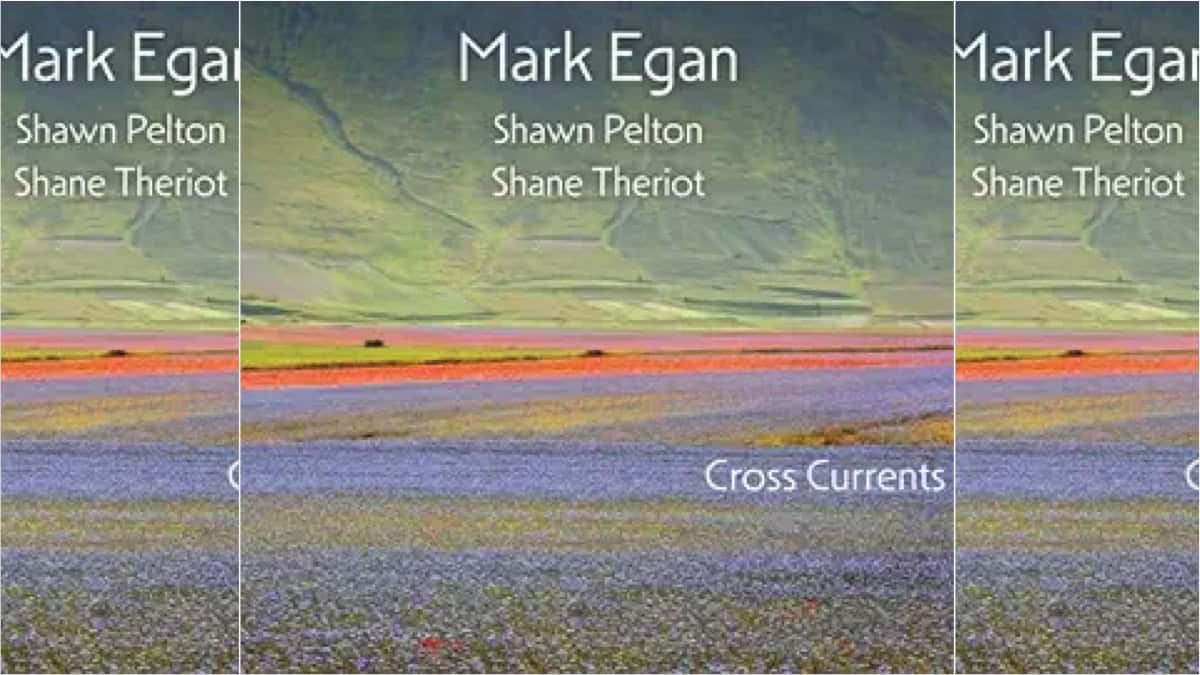
Mark Egan, Cross Currents…
It is exciting every time I get a new album from Mark Egan as he is such an amazingly versatile player and I never know what to expect (except for excellent artistry!) In his latest release, Mark has teamed up with Shawn Peyton on drums and Shane Theriot on guitar to bring us “Cross Currents”.
This collection of eleven tracks transports me to the Gulf Coast (New Orleans specifically). Mark’s fretless basses lay down a solid groove and lots of juicy solo work for this rootsy collection of funk, ambient, swamp-rock, second line, ballads, Cajun and even Indian Raga.
This trio is super-tight and the musicianship is flawless as each member has ample opportunity to shine. Even though each player is very talented in their own right, I feel that the collective energy is greater than just the sum of the players on this album. Each musician contributed to composing music for this project but the lion’s share are Mark’s original pieces.
I spent the summer of 1981 in New Orleans and this wonderful music takes me back to those fond memories. I participated in a wacky raft race on Lake Ponchatrain and this opening track elicits images of fun, sunshine, music, and great food.
This is another superb album that everyone will enjoy. Get your copy today! Cross Currents is available online at Amazon.com. Visit Mark online at markegan.com.











